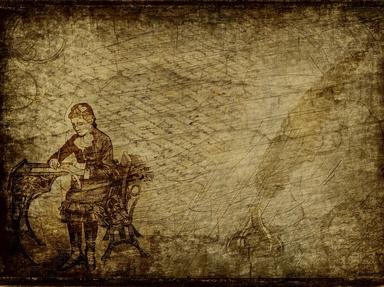Quiz Answer Key and Fun Facts
1. What will you be if you can do all the things Kipling suggests you do in his poem "If"?
2. "You Lazarushian-leather _____!
Though I've belted you and flayed you,
By the livin' Gawd that made you,
You're a better man than I am, _____!"
Who is a better man than the poet?
3. "And that after this is accomplished, and the brave new world begins
When all men are paid for existing and no man must pay for his sins,
As surely as Water will wet us, as surely as Fire will burn,
The Gods of the ______ with terror and slaughter return!"
What words are missing from the blank in this Kipling poem?
4. What Kipling poem was set to music by Oley Speaks in 1907? It begins, "By the old Moulmein Pagoda, lookin' lazy at the sea, / There's a Burma girl a-settin', and I know she thinks o' me."
5. "We never pay any-one Dane-geld," Kipling writes, "No matter how trifling the cost; / For the end of that game is oppression and shame, / And the nation that plays it is lost!" What is Dane-geld?
6. "For they're hangin' _____, you can hear the Dead March play,
The Regiment's in 'ollow square-they're hangin' him to-day;
They've taken of his buttons off an' cut his stripes away,
An' they're hangin' ______ in the mornin'."
Who are they hanging?
7. Kipling's poem "Recessional" was composed for what queen's Diamond Jubilee?
8. In Kipling's poem "The Last of the Light Brigade," what poet do Crimean War survivors visit in order to reproach him for not writing a sequel to his famous poem?
9. Who "went into a public-'ouse to get a pint o' beer," only to have the publican up and say, "We serve no red-coats here"?
10. What is a "Fuzzy-Wuzzy" in Kipling's poem by that title?
11. "For the _____ of the species is more deadly than the male." What word is missing from this Kipling verse?
12. What poem did Kipling write for the youngest recipient of the Victoria Cross, who valiantly remained at his post on ship during the Battle of Jutland in World War I?
13. "But there is neither East nor _____, Border, nor Breed, nor Birth, / When two strong men stand face to face, though they come from the ends of the earth." What word is missing from this famous Kipling poem?
14. What Kipling poem begins, "We're foot--slog--slog--slog--sloggin' over Africa / Foot--foot--foot--foot--sloggin' over Africa"?
15. "I keep six honest serving-men / (They taught me all I knew); / Their names are What and Why and When / And How and Where and ____." What word is missing from this blank?
Source: Author
skylarb
This quiz was reviewed by FunTrivia editor
LeoDaVinci before going online.
Any errors found in FunTrivia content are routinely corrected through our feedback system.

